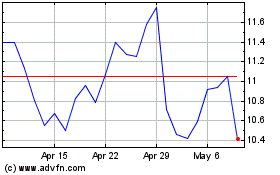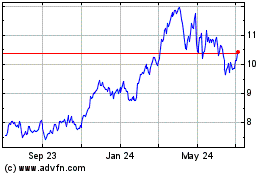European Bank Shares Muted On IMF Taxes Proposal
April 21 2010 - 4:04AM
Dow Jones News
Shares of banks across Europe gave a muted reaction Wednesday to
an International Monetary Fund proposal to double-tax financial
institutions to prevent and pay for future crises.
In the proposal, to be presented to the G20 finance-ministers in
a meeting Friday, the IMF is calling for a "financial stability
contribution" and a "financial activities tax."
Under the first, financial institutions would initially pay a
flat tax for "the fiscal cost of any future government support to
the sector," according to an IMF document. Overtime, the rate would
be adjusted based on the systemic risk of each institution.
The financial activities tax would be imposed on profits and
compensation. That tax could serve other purposes beyond building
up a fund, such as avoiding excess risk-taking by banks, the IMF
said.
According to analysts, any new taxes will likely hurt the
sector, particularly banks, which are already facing the pressure
from new capital requirements under the Basel III and are unlikely
to hit profits they did before the financial crisis.
The IMF proposal, however, was largely expected and is still in
early stages, with little details available. A final set of
measures on the taxes will be presented in a G20 summit in June,
the IMF said.
The Stoxx Europe 600 banking index opened up 0.3% Wednesday, but
was flat at 0727 GMT.
In the U.K., Barclays PLC (BCS) stock was up 1.3%, followed by
Lloyds Banking Group PLC (LYG), which was up 1.1%. HSBC Holdings
PLC (HBC) and Standard Chartered PLC (STAN.LN) both rose 0.1%.
In Spain, Banco Santander SA (STD) was flat, while Banco Bilbao
Vizcaya Argentaria SA (BBVA) shares were down 0.2%.
Swiss banks were also mixed, with UBS AG (UBS) up 0.1% and
Credit Suisse Group (CS) lower 0.4%.
In France, Societe Generale SA (GLE.FR) was down 0.3%, while BNP
Paribas SA (BNP.FR) was 0.5% lower. Credit Agricole SA (ACA.FR) was
up 0.4%.
In Germany, Deutsche Bank AG (DB) shares were down 0.2%, while
Commerzbank AG (CBK.XE) shares were flat.
"News of new tax proposals isn't a shock anymore, and at this
point investors have got the message that going forward, banks will
have lower profitability," Oriel Securities analyst Mike Trippitt
said.
The British Bankers' Association wasn't immediately available to
comment on the IMF proposal.
Last week, the French Banking Federation said banks in that
country strongly opposed plans to impose a new tax on banks. "Such
a tax would be unjustified and would have serious consequences for
the financing of the economy and the competitiveness of companies,
and would therefore impact growth," the FBF said in the statement
at that time.
The IMF proposal will ignite deep debates in the U.S. and
Europe, where many countries are pushing for various bank taxes and
other resolutions to address any future crisis.
The French government has said it was waiting for the IMF report
before deciding how to design its bank tax. The U.K., which had
been lobbying nations for more than a year to adopt such financial
levies, welcomed the proposal.
In the U.S., the government has proposed a $90 billion tax on
financial institutions to help pay for the direct costs of the
financial bailout.
The administration would assess a fee of 0.15% on liabilities,
other than deposits and certain required capital holdings of
financial institutions with more than $50 billion in assets.
In the paper, the IMF said international cooperation would be
"beneficial," and "unilateral actions by governments risk being
undermined by tax and regulatory arbitrage."
-By Patricia Kowsmann, Dow Jones Newswires. Tel
+44(0)207-842-9295, patricia.kowsmann@dowjones.com
(Anita Greil in Zurich, Jethro Mullen in Paris, William Launder
in Frankfurt and Christopher Bjork in Madrid contributed to this
story.)
BBVA Bilbao Vizcaya Arge... (NYSE:BBVA)
Historical Stock Chart
From Sep 2024 to Oct 2024

BBVA Bilbao Vizcaya Arge... (NYSE:BBVA)
Historical Stock Chart
From Oct 2023 to Oct 2024
